447 scholarly books by Seagull Books and 19
have author last names that start with L
447 scholarly books by Seagull Books and 19
447 scholarly books by Seagull Books
19 have author last names that start with L have author last names that start with L
19 have author last names that start with L have author last names that start with L
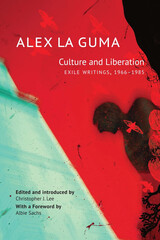
Culture and Liberation
Exile Writings, 1966–1985
Alex La Guma
Seagull Books, 2020
One of South Africa’s best-known writers during the apartheid era, Alex La Guma was a lifelong activist and a member of the South African Communist Party and the African National Congress. Persecuted and imprisoned by the South African regime in the 1950s and 60s, La Guma went into exile in the United Kingdom with his wife and children in 1966, eventually serving as the ANC’s diplomatic representative for Latin America and the Caribbean in Cuba. Culture and Liberation captures a different dimension of his long writing career by collecting his political journalism, literary criticism, and other short pieces published while he was in exile.
This volume spans La Guma’s political and literary life in exile through accounts of his travels to Algeria, Lebanon, Vietnam, Soviet Central Asia, and elsewhere, along with his critical assessments of Paul Robeson, Nadine Gordimer, Maxim Gorky, Alexander Solzhenitsyn, and Pablo Neruda, among other writers. The first dedicated collection of La Guma’s exile writing, Culture and Liberation restores an overlooked dimension of his life and work, while opening a window on a wider world of cultural and political struggles in Africa, Asia, and Latin America during the second half of the twentieth century.
This volume spans La Guma’s political and literary life in exile through accounts of his travels to Algeria, Lebanon, Vietnam, Soviet Central Asia, and elsewhere, along with his critical assessments of Paul Robeson, Nadine Gordimer, Maxim Gorky, Alexander Solzhenitsyn, and Pablo Neruda, among other writers. The first dedicated collection of La Guma’s exile writing, Culture and Liberation restores an overlooked dimension of his life and work, while opening a window on a wider world of cultural and political struggles in Africa, Asia, and Latin America during the second half of the twentieth century.
[more]

Bad Sheep
Katja Lange-Müller
Seagull Books, 2024
A touching and sensitive tale of love and loss that unfolds in a divided Berlin in the 1980s.
Against the backdrop of West Berlin in 1987, meet Soja—a skilled typesetter, a refugee from East Germany, and a temporary florist with a generous heart. Her life takes an unexpected turn when she crosses paths with Harry—a tall, free-spirited individual with a quietly determined demeanor, haunted by a complex past and an uncertain future. Their encounter sets in motion a fateful connection that leaves a lasting mark on Soja’s life.
The remnants of their story are encapsulated in a school notebook, containing precisely eighty-nine undated entries where Harry chronicled his thoughts during their time together. However, conspicuous by its absence in the narrative is Soja herself. Years later, driven by the need to tell their tale and fill the void left by Harry, she embarks on a poignant journey of remembrance.
As Soja revisits the man who both impressed her with determination and disconcerted her with a mysterious gift, she finds herself captivated by his childlike essence. Despite Harry’s troubled history—ten years in prison, probation violations due to discontinued drug therapy, and the looming threat of immediate imprisonment—Soja remains resolute in her passion for him.
Katja Lange-Müller, an acclaimed storyteller, skillfully draws readers into the heart of this novel. With sensitivity, humor, and melancholy, she unfolds the narrative of an unhappy love story that transforms into the greatest happiness in life. Along the way, Lange-Müller paints an atmospherically dense portrait of the divided and stagnant Berlin of the 1980s, creating a captivating and emotionally charged reading experience.
Against the backdrop of West Berlin in 1987, meet Soja—a skilled typesetter, a refugee from East Germany, and a temporary florist with a generous heart. Her life takes an unexpected turn when she crosses paths with Harry—a tall, free-spirited individual with a quietly determined demeanor, haunted by a complex past and an uncertain future. Their encounter sets in motion a fateful connection that leaves a lasting mark on Soja’s life.
The remnants of their story are encapsulated in a school notebook, containing precisely eighty-nine undated entries where Harry chronicled his thoughts during their time together. However, conspicuous by its absence in the narrative is Soja herself. Years later, driven by the need to tell their tale and fill the void left by Harry, she embarks on a poignant journey of remembrance.
As Soja revisits the man who both impressed her with determination and disconcerted her with a mysterious gift, she finds herself captivated by his childlike essence. Despite Harry’s troubled history—ten years in prison, probation violations due to discontinued drug therapy, and the looming threat of immediate imprisonment—Soja remains resolute in her passion for him.
Katja Lange-Müller, an acclaimed storyteller, skillfully draws readers into the heart of this novel. With sensitivity, humor, and melancholy, she unfolds the narrative of an unhappy love story that transforms into the greatest happiness in life. Along the way, Lange-Müller paints an atmospherically dense portrait of the divided and stagnant Berlin of the 1980s, creating a captivating and emotionally charged reading experience.
[more]
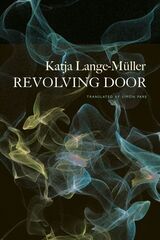
Revolving Door
Katja Lange-Müller
Seagull Books, 2022
The English debut of an idiosyncratic narrative voice.
“What now?” wonders Asta, a nurse who has returned to Germany after a final assignment in Nicaragua. After over twenty years working for international aid organizations, her services are no longer needed. No one is waiting for her. She has nowhere to go. Even the language has lost its familiarity. She stands next to a revolving door at Munich airport, observing the other travelers as she smokes one duty-free cigarette after another. Some of these strangers resemble figures from her past, bringing memories of an adventurous life flooding back. Her catalog of tragicomic attempts at assistance in Germany, Nicaragua, India, Mongolia, and Tunisia raises questions about what it takes to help and whom we are really helping. Katja Lange-Müller’s works have been critically acclaimed for their dark humor and affectionate, nuanced portrayals of characters wrestling with knotty situations and relationships. Revolving Door marks a fitting English debut of this most idiosyncratic of narrative voices.
“What now?” wonders Asta, a nurse who has returned to Germany after a final assignment in Nicaragua. After over twenty years working for international aid organizations, her services are no longer needed. No one is waiting for her. She has nowhere to go. Even the language has lost its familiarity. She stands next to a revolving door at Munich airport, observing the other travelers as she smokes one duty-free cigarette after another. Some of these strangers resemble figures from her past, bringing memories of an adventurous life flooding back. Her catalog of tragicomic attempts at assistance in Germany, Nicaragua, India, Mongolia, and Tunisia raises questions about what it takes to help and whom we are really helping. Katja Lange-Müller’s works have been critically acclaimed for their dark humor and affectionate, nuanced portrayals of characters wrestling with knotty situations and relationships. Revolving Door marks a fitting English debut of this most idiosyncratic of narrative voices.
[more]
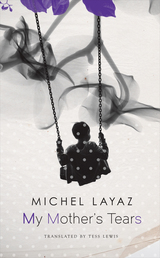
My Mother’s Tears
Michel Layaz
Seagull Books, 2019
With subtle, bemused humor and an unerring eye for human frailty, Michel Layaz writes about the hidden tensions within families, the awkwardness of adolescence, and the drama of intimacy between friends and lovers. His fifth novel, My Mother’s Tears, is his most poignant yet.
The adult narrator of My Mother’s Tears has returned to clean out his childhood home after his mother’s death. In thirty short chapters, each focused on a talismanic object or resonant episode from his childhood, the narrator tries to solve the mystery behind the flood of tears with which his strikingly beautiful, intelligent, and inscrutable mother greeted his birth. Like insects preserved in amber, these objects—an artificial orchid, a statue, a pair of green pumps, a steak knife, a fishing rod and reel, among others—are surrounded by an aura that permeates the narrator’s life. Interspersed with these chapters are fragments from the narrator’s conversation with his present lover, a woman who demands that he verbally confront his past. This difficult conversation charts his gradual liberation from the psychological wounds he suffered growing up.
Not only an account of a son’s attempt to understand his enigmatic mother, My Mother’s Tears is also a moving novel about language and memory that explores the ambivalent power of words to hurt and to heal, to revive the past and to put childhood demons to rest.
The adult narrator of My Mother’s Tears has returned to clean out his childhood home after his mother’s death. In thirty short chapters, each focused on a talismanic object or resonant episode from his childhood, the narrator tries to solve the mystery behind the flood of tears with which his strikingly beautiful, intelligent, and inscrutable mother greeted his birth. Like insects preserved in amber, these objects—an artificial orchid, a statue, a pair of green pumps, a steak knife, a fishing rod and reel, among others—are surrounded by an aura that permeates the narrator’s life. Interspersed with these chapters are fragments from the narrator’s conversation with his present lover, a woman who demands that he verbally confront his past. This difficult conversation charts his gradual liberation from the psychological wounds he suffered growing up.
Not only an account of a son’s attempt to understand his enigmatic mother, My Mother’s Tears is also a moving novel about language and memory that explores the ambivalent power of words to hurt and to heal, to revive the past and to put childhood demons to rest.
[more]
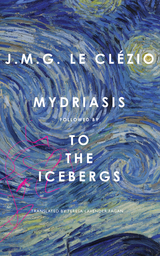
Mydriasis
Followed by ‘To the Icebergs’
J. M. G. Le Clezio
Seagull Books, 2019
While presenting the Nobel Prize in Literature to J. M. G. Le Clézio in 2008, the Nobel Committee called him the “author of new departures, poetic adventure and sensual ecstasy, explorer of a humanity beyond and below the reigning civilization.” In Mydriasis, the author proves himself to be precisely that as he takes us on a phantasmagoric journey into parallel worlds and whirling visions. Dwelling on darkness, light, and human vision, Le Clézio’s richly poetic prose composes a mesmerizing song and a dizzying exploration of the universe—a universe not unlike the abysses explored by the highly idiosyncratic Belgian poet Henri Michaux.
Michaux is, in fact, at the heart of To the Icebergs. Fascinated by his writing, Le Clézio includes Michaux’s "poem of the poem," "Iniji," thereby allowing the poet’s voice to emerge by itself. What follows is much more than a simple analysis of the poem; rather, it is an act of complete insight and understanding, a personal appropriation and elevation of the work. Written originally in the 1970s and now translated into English for the first time, these two brief, incisive and haunting texts will further strengthen the reputation of one of the world’s greatest and most visionary living writers.
Michaux is, in fact, at the heart of To the Icebergs. Fascinated by his writing, Le Clézio includes Michaux’s "poem of the poem," "Iniji," thereby allowing the poet’s voice to emerge by itself. What follows is much more than a simple analysis of the poem; rather, it is an act of complete insight and understanding, a personal appropriation and elevation of the work. Written originally in the 1970s and now translated into English for the first time, these two brief, incisive and haunting texts will further strengthen the reputation of one of the world’s greatest and most visionary living writers.
[more]

On the Wrong Side
J. M. G. Le Clézio
Seagull Books, 2024
A short story collection from Nobel Prize winner J. M. G. Le Clézio offers a poignant and powerful exploration of the lives of the underprivileged and marginalized.
J. M. G. Le Clézio’s On the Wrong Side, a collection of eight short stories, continues the author’s life-long pursuit of granting visibility to the unseen and a voice to the voiceless. Here, the author focuses on the underclasses, primarily children who have been left behind, abandoned, and subjected to unspeakable violence.
In these haunting tales, we encounter Maureez Samson, a mistreated orphan from Rodrigues Island, who, thanks to her exceptional voice, becomes a famous singer and defies all expectations; some young Indians in Darién, a region straddling Panama and Colombia, struggle to raise their young son and save their idyllic land from its invasion and destruction by drug lords; Juanico and Chuche, two slave children who are taken in by the community of Saint Kateri Takakwitha after an arduous and perilous journey; and in Nogales, on the border between Mexico and the United States, the “street rats,” children who cross through the sewers to wreak havoc and perhaps indulge their dreams of life on the other side.
In Le Clézio’s own words, these stories are not simply meant to reveal or describe the plight of the “rejected,” but to “create in the reader a feeling of revolt in the face of the injustice of what is happening to them.”
J. M. G. Le Clézio’s On the Wrong Side, a collection of eight short stories, continues the author’s life-long pursuit of granting visibility to the unseen and a voice to the voiceless. Here, the author focuses on the underclasses, primarily children who have been left behind, abandoned, and subjected to unspeakable violence.
In these haunting tales, we encounter Maureez Samson, a mistreated orphan from Rodrigues Island, who, thanks to her exceptional voice, becomes a famous singer and defies all expectations; some young Indians in Darién, a region straddling Panama and Colombia, struggle to raise their young son and save their idyllic land from its invasion and destruction by drug lords; Juanico and Chuche, two slave children who are taken in by the community of Saint Kateri Takakwitha after an arduous and perilous journey; and in Nogales, on the border between Mexico and the United States, the “street rats,” children who cross through the sewers to wreak havoc and perhaps indulge their dreams of life on the other side.
In Le Clézio’s own words, these stories are not simply meant to reveal or describe the plight of the “rejected,” but to “create in the reader a feeling of revolt in the face of the injustice of what is happening to them.”
[more]
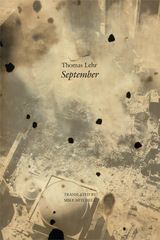
September
Mirage
Thomas Lehr
Seagull Books, 2013
Two fathers with two daughters: Martin, professor of German, writes but is studying Earth Sciences at MIT; Tariq, a doctor in Baghdad and Muna, is studying the archaeology of a region that is seen as the cradle of civilization. These two parallel relationships in two very different parts of the world expose the human similarities beneath cultural differences. In Thomas Lehr’s moving and realistic novel, the similarities between these men become a similarity of suffering as well. Martin’s daughter dies with her mother in the World Trade Center on September 11, 2001, and though Tariq survives three wars and Saddam Hussein’s regime intact, his family does not—in the last days of the conflict, his daughter is raped, her lover is murdered, and she sees her sister and mother die in a bomb attack.
Out of these tragedies that almost seem to define the first decade of our century, Lehr has fashioned a richly woven, multilayered tapestry that not only explores the human side but brings out the cultural, historical, social, and political context within which the tragedies occur. The alternating interior monologues of the four main characters engage the reader in language which reaches an unforgettable poetic intensity.
[more]
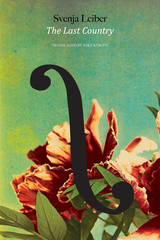
The Last Country
Svenja Leiber
Seagull Books, 2017
Now in paperback, the epic tale of a violinist who must navigate the fractious world of early twentieth-century Germany.
“Ruven Preuk stands apart from the village, on an August day in 1911, and listens.” Thus begins an epic bildungsroman about the life of Ruven Preuk, son of the wainwright, child of a sleepy village in Germany’s north, where life is both simple and harsh.
Ruven, though, is neither. He has the ability to see sounds, leading him to discover an uncanny gift for the violin. When he meets a talented teacher in the Jewish quarter, Ruven falls under the spell of a prodigious future. But as the twentieth century looms, Ruven’s pursuit of his craft takes a turn. In The Last Country, Svenja Leiber spins a tale that moves from the mansions of a disappearing aristocracy to a communist rebellion, from a joyous village wedding to a Nazi official’s threats, from the First World War to the Second. As the world Ruven knows disappears, the gifted musician must grapple with an important question: to what end has he devoted himself to his art?
Winner of the 2015 Arno Reinfrank Literaturpreis
“Ruven Preuk stands apart from the village, on an August day in 1911, and listens.” Thus begins an epic bildungsroman about the life of Ruven Preuk, son of the wainwright, child of a sleepy village in Germany’s north, where life is both simple and harsh.
Ruven, though, is neither. He has the ability to see sounds, leading him to discover an uncanny gift for the violin. When he meets a talented teacher in the Jewish quarter, Ruven falls under the spell of a prodigious future. But as the twentieth century looms, Ruven’s pursuit of his craft takes a turn. In The Last Country, Svenja Leiber spins a tale that moves from the mansions of a disappearing aristocracy to a communist rebellion, from a joyous village wedding to a Nazi official’s threats, from the First World War to the Second. As the world Ruven knows disappears, the gifted musician must grapple with an important question: to what end has he devoted himself to his art?
Winner of the 2015 Arno Reinfrank Literaturpreis
[more]

Kazimira
Svenja Leiber
Seagull Books, 2024
A gripping and emotionally resonant saga that traces the lives of five generations of resilient women from the late nineteenth century to the dawn of the twenty-first.
Towards the end of the nineteenth century in East Prussia, a woman named Kazimira strolls the remote shores of the Baltic Sea, bringing home bits of amber that wash up on the beach. Her husband Antas is the region’s best carver, and he catches the attention of Moritz Hirschberg, owner of a nearby amber factory. Antas rises through the ranks, but Kazimira has the best ideas for processing and cutting the stones. Although establishing a new mine on such shifting terrain is hazardous, the venture finally pays off. It brings success, but envy and resentment swiftly follow, as antisemitism and nationalism sweep across the German Empire. Kazimira soon learns she must go her own way, as the Hirshbergs are expelled and World War I shatters her son. Three decades later, at the end of World War II, she becomes the last witness of German war crimes committed on West Beach, formerly a place of prosperity and progress.
At the dawn of the twenty-first century in Russia, a woman named Nadia operates an excavator in a massive open-pit amber mine until she is told to go sell trinkets alongside all the other shopgirls. In alternating passages weaving together vastly different eras across the span of a century and a half, Svenja Leiber’s Kazimira tells the story of the largest amber-mining operation in history, and its lasting effects expose pressing questions: Where do hatred and violence come from? What happens when life is declared worthless? Beginning with Kazimira and her bold struggle for self-determination, this saga follows five generations of women who envision an alternative world.
Towards the end of the nineteenth century in East Prussia, a woman named Kazimira strolls the remote shores of the Baltic Sea, bringing home bits of amber that wash up on the beach. Her husband Antas is the region’s best carver, and he catches the attention of Moritz Hirschberg, owner of a nearby amber factory. Antas rises through the ranks, but Kazimira has the best ideas for processing and cutting the stones. Although establishing a new mine on such shifting terrain is hazardous, the venture finally pays off. It brings success, but envy and resentment swiftly follow, as antisemitism and nationalism sweep across the German Empire. Kazimira soon learns she must go her own way, as the Hirshbergs are expelled and World War I shatters her son. Three decades later, at the end of World War II, she becomes the last witness of German war crimes committed on West Beach, formerly a place of prosperity and progress.
At the dawn of the twenty-first century in Russia, a woman named Nadia operates an excavator in a massive open-pit amber mine until she is told to go sell trinkets alongside all the other shopgirls. In alternating passages weaving together vastly different eras across the span of a century and a half, Svenja Leiber’s Kazimira tells the story of the largest amber-mining operation in history, and its lasting effects expose pressing questions: Where do hatred and violence come from? What happens when life is declared worthless? Beginning with Kazimira and her bold struggle for self-determination, this saga follows five generations of women who envision an alternative world.
[more]
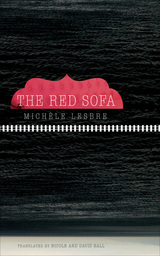
The Red Sofa
Michèle Lesbre
Seagull Books, 2017
Now in paperback, The Red Sofa is a quiet French novella exploring love, memory, and the perspective that travel gives us on both.
In The Red Sofa, we meet Anne, a young woman setting off on the Trans-Siberian Railway in order to find her former lover, Gyl, who left twenty years before. As the train moves across post-Soviet Russia and its devastated landscapes, Anne reflects on her past with Gyl and their patriotic struggles, as well as on the neighbor she has just left behind, Clémence Barrot.
Rocked by the train’s movements Anne is moved by her memory of Clémence, who is old and whose memory is failing, but who has not lost her taste for life and adventure. Ensconced on her red sofa at home, Clémence loves to tell Anne her life story, mourning lost loved ones and celebrating the lives of brave, rebellious women who went before her. Eventually, Anne’s train trip returns her home having not found Gyl, but having found something much more meaningful—herself.
In The Red Sofa, we meet Anne, a young woman setting off on the Trans-Siberian Railway in order to find her former lover, Gyl, who left twenty years before. As the train moves across post-Soviet Russia and its devastated landscapes, Anne reflects on her past with Gyl and their patriotic struggles, as well as on the neighbor she has just left behind, Clémence Barrot.
Rocked by the train’s movements Anne is moved by her memory of Clémence, who is old and whose memory is failing, but who has not lost her taste for life and adventure. Ensconced on her red sofa at home, Clémence loves to tell Anne her life story, mourning lost loved ones and celebrating the lives of brave, rebellious women who went before her. Eventually, Anne’s train trip returns her home having not found Gyl, but having found something much more meaningful—herself.
[more]
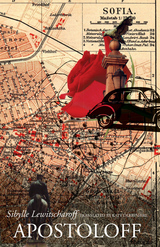
Apostoloff
Sibylle Lewitscharoff
Seagull Books, 2019
“Gone, finito, The End, I say. A father who puts an end to it all before he wears down the whole family deserves more praise than damnation.”
Two sisters travel to Sofia—in a convoy of luxury limousines arranged by a fellow Bulgarian exile—to bury their less-than-beloved father. Like tourists, they are chauffeured by the ever-charming Ruben Apostoloff—one sister in the back seat, one in the passenger seat, one sharp-tongued and aggressive, the other polite and considerate. In a caustic voice, Apostoloff shows them the treasures of his beloved country: the peacock-eye pottery (which contains poisonous dye), the Black Sea coast (which is utterly destroyed), the architecture (a twentieth-century crime). His attempts to win them over seem doomed to fail, as the sisters’ Bulgarian heritage is a heavy burden—their father, a successful doctor and melancholy immigrant, appears in their dreams still dragging the rope with which he hanged himself.
An account of a daughter’s bitterly funny reckoning with her father and his country, laden with linguistic wit and black humor, Apostoloff will introduce the unique voice of Sibylle Lewitscharoff to a new and eager audience.
[more]
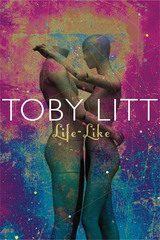
Life-Like
Toby Litt
Seagull Books, 2014
Emotionally compelling and formally innovative, Life-Like is Toby Litt’s most ambitious collection of short stories to date, bringing to fruition themes first aired in his previous books, Adventures in Capitalism, Exhibitionism, and I Play the Drums in a Band Called Okay. Life-Like is a book about our globalizing and atomizing world—with stories set in India, Sweden, Australia, and Iran—that also looks at how we meet and fail to meet and what connects us to one another, as well as waste and communication, and, in turn, communication through waste.
The twenty-six stories begin with Paddy and Agatha, an English couple last seen in Litt’s Ghost Story. Following the stillbirth of their second child, their marriage has gently begun to collapse. Paddy and Agatha both meet someone else. First, Paddy meets Kavita, and Agatha meets John. Then each of these four engages with a different new person—and so on, through a doubling and redoubling of intimately interconnected stories. The remaining short stories exemplify Litt’s impressive, unflinching prose.
The twenty-six stories begin with Paddy and Agatha, an English couple last seen in Litt’s Ghost Story. Following the stillbirth of their second child, their marriage has gently begun to collapse. Paddy and Agatha both meet someone else. First, Paddy meets Kavita, and Agatha meets John. Then each of these four engages with a different new person—and so on, through a doubling and redoubling of intimately interconnected stories. The remaining short stories exemplify Litt’s impressive, unflinching prose.
[more]
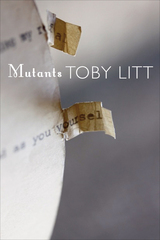
Mutants
Selected Essays
Toby Litt
Seagull Books, 2016
Toby Litt is best known for his “hip-lit” fiction, which, in its sharing of characters and themes across numerous stories and novels, has always taken an unusual, hybrid form. In Mutants, he applies his restless creativity to nonfiction. The book brings together twenty-six essays on a range of diverse topics, including writers and writing, and the technological world that informs and underpins it. Each essay is marked by Litt’s distinct voice, heedless of formal conventions and driven by a curiosity and a determination to give even the shortest piece enough conceptual heft to make it come alive. Taken as a whole, these pieces unexpectedly cohere into a manifesto of sorts, for a weirder, wilder, more willful fiction.
Praise for Toby Litt
“A genuinely individual talent with a positive relish for dealing with the contemporary aspects of the modern world.”—Scotsman
“Toby Litt is awfully good—he gives something new every time he writes.”—Muriel Spark
“He has invented a fresh, contemporary style—it will sing in the ears of this generation.”—Malcolm Bradbury
Praise for Toby Litt
“A genuinely individual talent with a positive relish for dealing with the contemporary aspects of the modern world.”—Scotsman
“Toby Litt is awfully good—he gives something new every time he writes.”—Muriel Spark
“He has invented a fresh, contemporary style—it will sing in the ears of this generation.”—Malcolm Bradbury
[more]
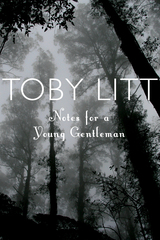
Notes for a Young Gentleman
Toby Litt
Seagull Books, 2017
Toby Litt is one of that rare breed of fiction writers who never writes the same book twice: every time out, he takes an unexpected new tack—and his readers happily follow.
Told in the form of the pithy, even lyrical advice a young soldier leaves behind after a mission gone wrong, Notes for a Young Gentleman is no exception. Its brilliantly creative form, and the epigrammatic genius Litt displays in its creation, nonetheless can’t hide the powerful, emotional story at its heart: of a young soldier parachuting toward a beautiful, moonlit country house on a mission . . . of betrayal. The house? Marlborough. The target? Winston Churchill, an old friend of his father. A brilliant, at times dizzying but always heartfelt exploration of love, revenge, and the essence of a gentleman, Notes for a Young Gentleman is classic Toby Litt: wholly new and wholly unforgettable.
Told in the form of the pithy, even lyrical advice a young soldier leaves behind after a mission gone wrong, Notes for a Young Gentleman is no exception. Its brilliantly creative form, and the epigrammatic genius Litt displays in its creation, nonetheless can’t hide the powerful, emotional story at its heart: of a young soldier parachuting toward a beautiful, moonlit country house on a mission . . . of betrayal. The house? Marlborough. The target? Winston Churchill, an old friend of his father. A brilliant, at times dizzying but always heartfelt exploration of love, revenge, and the essence of a gentleman, Notes for a Young Gentleman is classic Toby Litt: wholly new and wholly unforgettable.
[more]
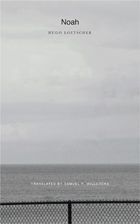
Noah
A Novel of the Boom Times
Hugo Loetscher
Seagull Books, 2012
As the current global recession stubbornly persists and financial experts around the world struggle to prevent further financial collapse, everyone has a theory about how to save the economy. But perhaps no idea that has been proffered is as radical or as unique as what Hugo Loetscher imagines in his novel Noah. In this book, first published in German in 1967, the eponymous Old Testament hero fuels his local economy with a prescient plan to build the Ark. Though no one around him seriously believes in the coming flood, everyone is more than willing to do business with him: “The people of Mesopotamia had never had it so good. There had been an economic miracle.” It is boom time in Mesopotamia, and the economy is flourishing; but as with many financial bubbles, scandal and demise are not far out of sight. An ancient legend retold in light of capitalist reality, Noah is a witty, delightful and thought-provoking parable of our times.
Hugo Loetscher (1929–2009), widely known as the most cosmopolitan of Swiss writers due to his travels and journalistic work in Latin America and Asia, has until now been known mainly by readers in his home country, where he has been the recipient of its most prestigious literary prize. This attentive and engaging translation makes available to a new audience an incredibly timely and entertaining work.
[more]
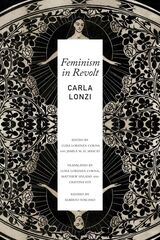
Feminism in Revolt
An Anthology
Carla Lonzi
Seagull Books, 2023
A comprehensive collection of texts from the most influential and iconic figure of Italian second-wave feminism.
Recently rediscovered in Italy and abroad, the works of Carla Lonzi tend to fall under the remit of art history or feminist theory. Art historians focus on the texts written in the 1960s, when Lonzi was still actively working as a critic, whereas feminist scholars engage with her more openly political interventions, published after her declared embrace of a separatist feminism. In 1970 Lonzi decided to leave the art world for good and dedicate herself to her newly founded feminist collective, Rivolta Femminile. While recognizing the break in Lonzi’s life and work, this anthology maps the overall arc of her intellectual and political production, giving equal weight to her seminal contributions to art criticism and her trailblazing feminist writings. A comprehensive collection of texts from the most influential and iconic figure of Italian second-wave feminism, Feminism in Revolt seeks to shed light on Lonzi’s versatile approach to literary genres and compositions by juxtaposing essayistic texts, poems, diary excerpts, and manifestos.
Recently rediscovered in Italy and abroad, the works of Carla Lonzi tend to fall under the remit of art history or feminist theory. Art historians focus on the texts written in the 1960s, when Lonzi was still actively working as a critic, whereas feminist scholars engage with her more openly political interventions, published after her declared embrace of a separatist feminism. In 1970 Lonzi decided to leave the art world for good and dedicate herself to her newly founded feminist collective, Rivolta Femminile. While recognizing the break in Lonzi’s life and work, this anthology maps the overall arc of her intellectual and political production, giving equal weight to her seminal contributions to art criticism and her trailblazing feminist writings. A comprehensive collection of texts from the most influential and iconic figure of Italian second-wave feminism, Feminism in Revolt seeks to shed light on Lonzi’s versatile approach to literary genres and compositions by juxtaposing essayistic texts, poems, diary excerpts, and manifestos.
[more]
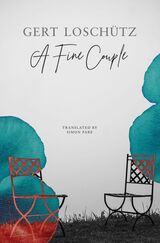
A Fine Couple
Gert Loschütz
Seagull Books, 2023
The story of the paradoxical relationship of two parents.
As he clears out his parents’ house, Philipp, a photographer, comes across an object that has played a major role in his parents’ lives. Herta and Georg made a fine couple when they first met. Their son imagines the early days of their relationship and remembers how his father was forced to flee across the inner-German border to the West. When Herta and Philipp joined him a few days later, this could have signaled the start of a new era of happiness, but the seeds of their separation had already been sown. In gentle, probing prose, Gert Loschütz describes how Philipp gradually unravels the paradoxical nature of his parents’ relationship: it was love that destroyed their love. To his astonishment, Philipp discovers that Herta and Georg had been in contact all those years in a way they kept secret even from one another.
As he clears out his parents’ house, Philipp, a photographer, comes across an object that has played a major role in his parents’ lives. Herta and Georg made a fine couple when they first met. Their son imagines the early days of their relationship and remembers how his father was forced to flee across the inner-German border to the West. When Herta and Philipp joined him a few days later, this could have signaled the start of a new era of happiness, but the seeds of their separation had already been sown. In gentle, probing prose, Gert Loschütz describes how Philipp gradually unravels the paradoxical nature of his parents’ relationship: it was love that destroyed their love. To his astonishment, Philipp discovers that Herta and Georg had been in contact all those years in a way they kept secret even from one another.
[more]
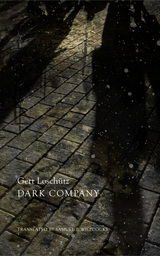
Dark Company
A Novel in Ten Rainy Nights
Gert Loschütz
Seagull Books, 2012
Over ten rainy nights, Thomas, an ex-bargeman who used to be skipper of his own boat, walks the muddy fields of the landlocked German interior and remembers the events that lost him his home, his boat, and his livelihood: his apprenticeship in the cold halls of the Royal Naval College in London; the dangers of the mean streets and waterfront of New York in the 1970s, and Poland under martial law; Germany after the reunification, when for a year or so it seemed that the whole country drifted rudderless, drawn by the current of history to who knows where. Thomas remembers childhood, his first love, and the warnings of his grandfather: Beware the dark company! This mysterious band of men and women dressed in black cast a shadow over his story, as he wrestles with the secrets, the unplumbed depths of his soul, the hazards lurking below a seemingly placid surface, and throughout it all, the rain, falling night after night. Dark Company is a superb example of a distinctly German tradition in weird fiction which claims its roots in Kafka and Herbert Rosendorfer.
[more]
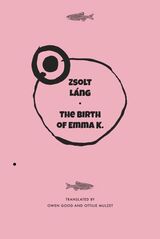
The Birth of Emma K.
Zsolt Láng
Seagull Books, 2022
An inventive collection of stories by one of the most prominent and acclaimed writers in Hungary today.
The Birth of Emma K., a collection of twelve short stories rich with magic, introduces English-language readers to one of the most vibrant and original voices in contemporary Hungarian literature. Zsolt Láng’s new collection opens with God sitting on a bench looking over Budapest; later, a Hungarian man who has stumbled into a Romanian music theory class suddenly finds he is able to speak expertly about Hungarian composer Béla Bartok—and in perfect Romanian; and even later, against all odds, the embryo of Emma fights for her future life from within the womb. Drifting between melancholic and witty, in sentences that are winding, subtle, and colloquial, Láng’s stories are deeply rooted in Transylvanian culture and history. Reminiscent of the best writings of Irish modernist masters such as Samuel Beckett and Flann O’Brien, The Birth of Emma K. presents an unforgettable collage of human nature.
The Birth of Emma K., a collection of twelve short stories rich with magic, introduces English-language readers to one of the most vibrant and original voices in contemporary Hungarian literature. Zsolt Láng’s new collection opens with God sitting on a bench looking over Budapest; later, a Hungarian man who has stumbled into a Romanian music theory class suddenly finds he is able to speak expertly about Hungarian composer Béla Bartok—and in perfect Romanian; and even later, against all odds, the embryo of Emma fights for her future life from within the womb. Drifting between melancholic and witty, in sentences that are winding, subtle, and colloquial, Láng’s stories are deeply rooted in Transylvanian culture and history. Reminiscent of the best writings of Irish modernist masters such as Samuel Beckett and Flann O’Brien, The Birth of Emma K. presents an unforgettable collage of human nature.
[more]
READERS
Browse our collection.
PUBLISHERS
See BiblioVault's publisher services.
STUDENT SERVICES
Files for college accessibility offices.
UChicago Accessibility Resources
home | accessibility | search | about | contact us
BiblioVault ® 2001 - 2024
The University of Chicago Press









